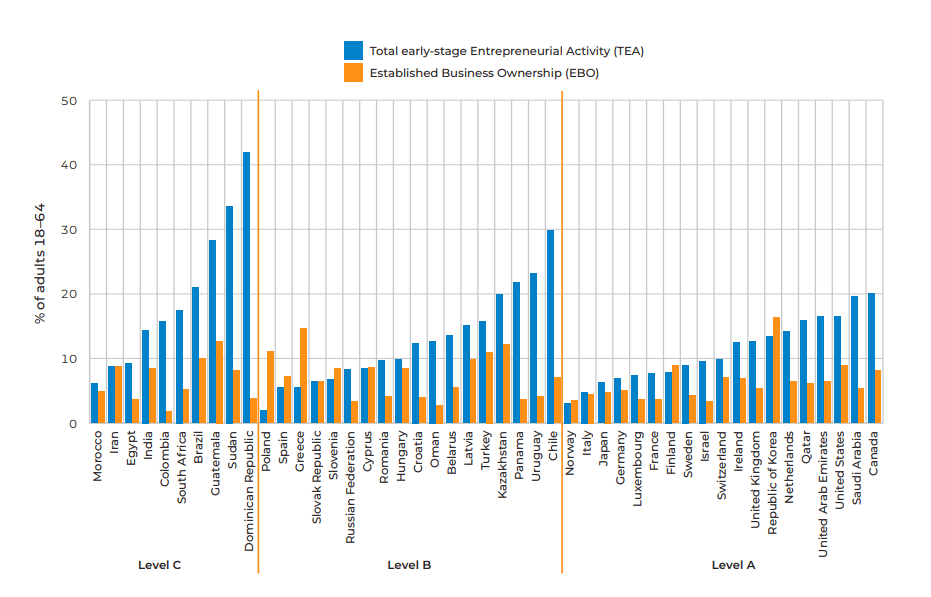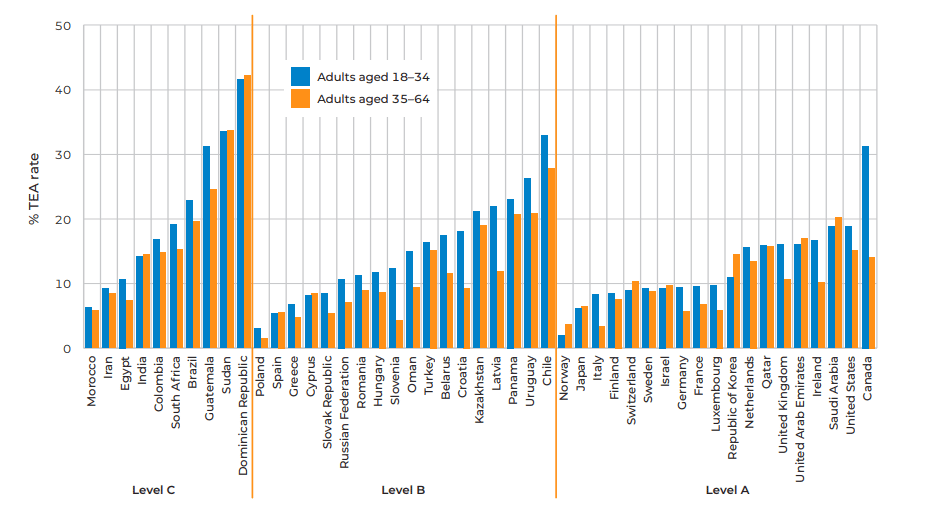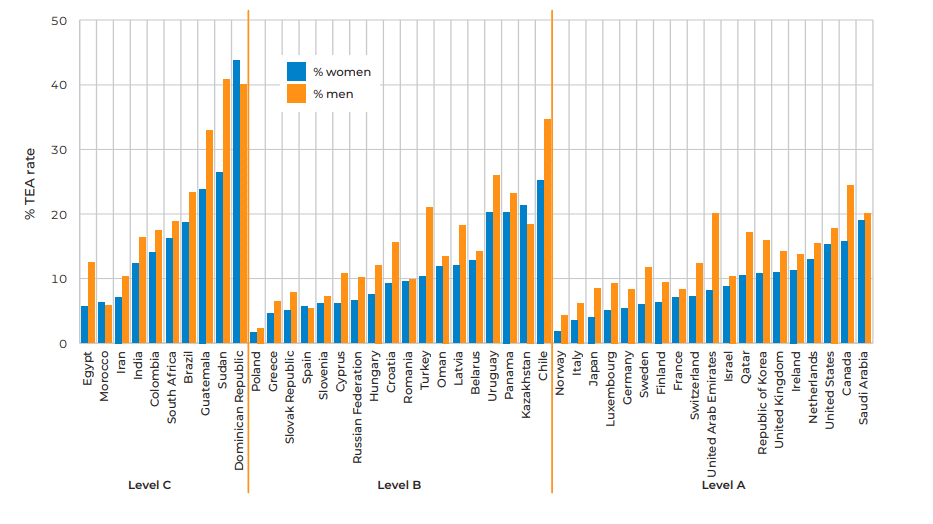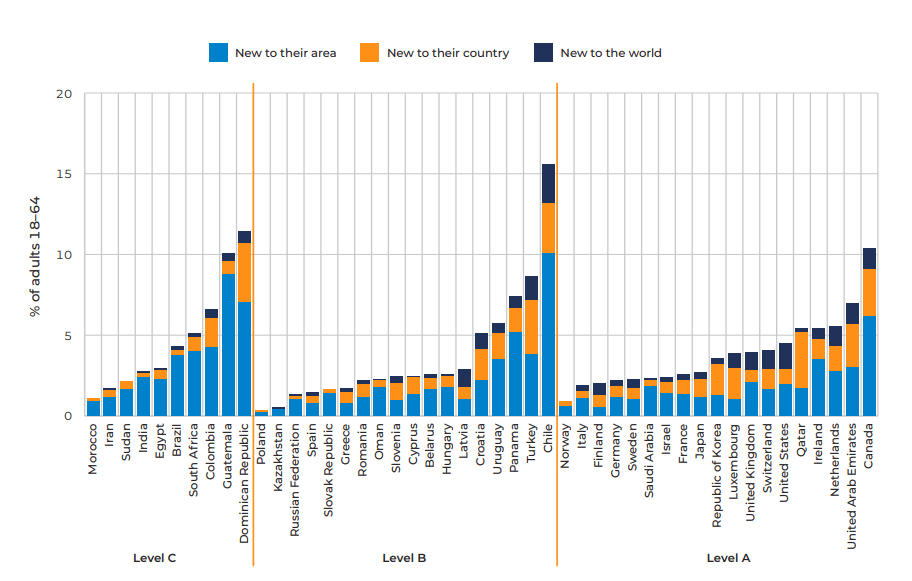Startup Statistics (How Many Startups Fail?)
Welcome to our roundup of startup statistics.
It’s an extremely competitive business landscape out there. So before you strike out on your new business venture, it’s important to know all the facts and figures relating to startups in 2023.
In this article, we’ll be covering all the most interesting stats about startups, and answering important questions like:
- How many startups fail?
- Why do startups fail?
- How many startups are there?
- How much does it cost to launch a startup?
Plus, a whole lot more. Ready? Let’s get started.
How many startups fail?
Failure rates among startups are surprisingly high. According to Failory, 9 out of 10 startups fail. Venture-backed startups have slightly higher success rates. However, 7.5 out of 10 still end in failure.
Top reasons why startups fail
In most cases, startups fail due to financial issues. In fact, 38% of startups fail due to a lack of funds or failure to raise capital.
Although money can be a big issue for startups, there are tons of other challenges facing new businesses. Here are some more of the most common reasons startups fail:
- 35% fail due to a lack of market need
- 20% fail to market competition
- 19% fail due to flaws in the business model
- 18% fail as a result of legal and regulatory issues
- 15% fail due to pricing and business cost issues
- 14% fail due to personnel and staffing issues
- 10% fail as a result of mistimed product launches
- 8% fail due to product quality
- 7% fail due to disharmony between investors and team members
- 6% fail as a result of incorrect pivoting
- 5% fail due to burnout or a lack of passion
Startup failure rates by industry
Some startup industries are more successful than others. The industry with the highest failure rate is ‘information’, and the industry with the lowest failure rate is ‘finance insurance and real estate’. Here’s a breakdown of startup failure rates by industry:
| Startup industry | % of businesses that fail |
| Information | 63 |
| Transportation and utilities | 55 |
| Retail | 53 |
| Construction | 53 |
| Manufacturing | 51 |
| Mining | 49 |
| Wholesale | 46 |
| Services | 45 |
| Agriculture | 44 |
| Education and health | 44 |
| Finance insurance and real estate | 42 |
When are startups most likely to fail?
Failure rates for startups vary depending on how long the company has been in operation. Startups are least likely to fail in the first year, with only a 20% failure rate according to Failory. However, years two and three are when startup ventures are most likely to failure. Here are the stats:
- Startups have a 20% failure rate in the first year
- Startups have a 30% failure rate in the second year
- Startups have a 50% failure rate in the third year
- Startups have a 70% failure rate by the 10th year of operation
Sources: CBInsights, Failory
How many startups are there?
There’s no definitive data available on the total number of startups globally, but our best estimate is somewhere in the region of 100-120 million.
This is a very rough estimation based on the fact that there are around 333 million companies across the world, and roughly a third of these are young businesses (in their first 5 years of operation).
How many startups are launched per year (globally)?
Again, we have very little to go off here—we can only estimate. But our best estimates are that there are somewhere around 50 million new startups launched per year. That’s about 137,000 per day.
This is based on an analysis by Moya K. Mason, using the information provided by Dr. Paul D. Reynold.
According to Dr. Reynold, entrepreneurs attempt to start about 150 million businesses per year, but only around a third of these are successfully launched.
How many startups are launched in the US each year?
According to data from the US Census Bureau, there were around 5 million new business applications processed in 2022. This is a good indication of the number of startups launched in the US each year.
New business applications in the US by year:
| Year | New business applications | % change YOY |
| 2022 | 5 million | -7.4% |
| 2021 | 5.4 million | +22.7% |
| 2020 | 4.4 million | +25.7% |
| 2019 | 3.5 million | +0% |
| 2018 | 3.5 million | +9.4% |
| 2017 | 3.2 million | +6.7% |
| 2016 | 3 million | +7.1% |
| 2015 | 2.7 million | +3.7% |
Startups by country (per StartupRanking)
Startup Ranking provides data on the number of registered startups in each country around the world. According to their ranking table, the US is the world leader when it comes to startups, with more than 10x as many as any other country.
Note that the numbers in the table below only reflect startups listed in Startup Ranking’s database.
As such, they’re significantly lower than what you’d expect given our above estimations of the number of startups worldwide and likely dramatically underestimate the real figures.
Top 10 countries by the number of startups:
| Rank | Country | Number of startups |
| 1 | US | 76,314 |
| 2 | India | 16,268 |
| 3 | UK | 6,863 |
| 4 | Canada | 3,795 |
| 5 | Australia | 2,756 |
| 6 | Indonesia | 2,476 |
| 7 | Germany | 2,395 |
| 8 | France | 1,599 |
| 9 | Spain | 1,445 |
| 10 | Brazil | 1,175 |
Sources:
Commerce Institute, Statista, JPMorgan Chase Institute, Moyak, Startup Ranking
Total early-stage entrepreneurial activity (TEA) startup statistics
Total early-stage entrepreneurial activity (TEA) tells us the percentage of the working population in a given economy (country) that is actively trying to launch a new business or already own/manage a startup.
It’s a useful data point for understanding how common startups are, and how important they are to the global economy. Let’s take a look at some statistics pertaining to TEA.
TEA by country
According to the latest GEM (Global Entrepreneurship Monitor) survey, survey, the Dominican Republic has the highest total early-stage entrepreneurial activity of any country.
42% of people in the Dominican Republic are already running, or in the process of launching, a startup.

On the opposite end of the spectrum, Poland has the lowest TEA—only 2% of people in Poland have launched or are planning to launch a startup.
If we narrow down the list and only look at ‘Level A’ economies (high-income countries with a GDP of >$40,000), Canada tops the list with a TEA of 20%
Top 10 countries by TEA (in Level A economies):
- Canada – 20%
- Saudi Arabia – 19%
- US – 16%
- UAE – 16%
- Qatar – 15%
- Netherlands – 14%
- Republic of Korea – 13%
- UK – 12%
- Ireland – 12%
- Switzerland – 10%
- Israel – 9%
TEA by age
According to the same GEM survey, total early-stage entrepreneurial activity is greater amongst adults aged 18-34 compared to those aged 35-64 in most economies. This suggests young people are more likely to launch startups.

In Canada, this age gap is very notable: Over 31% of adults aged 18-34 are running or planning to launch a new business, compared to less than 15% of those aged 35-64.
In the US, the gap is a little less pronounced, at around 19% of 18-34-year-olds, and 16% of 35-64-year-olds.
There are some exceptions to the rule, too. In countries including the Dominican Republic, Saudi Arabia, and Israel, TEA is higher amongst those aged 35-64 than among 18-34-year-olds. In these regions, older people are more likely to launch startups.
TEA by gender
Men are more likely to launch startups than women in most countries. TEA amongst men is higher in the vast majority of global economies, with four exceptions: Kazakhstan, Spain, Dominican Republic, and Morocco.

In the US, 18% of men are planning to launch or already run a startup, compared to 15% of women.
Sources: GEM 2021/2022 Global Report
Which country is the best for startups?
The GEM survey asked entrepreneurs in countries across the world to evaluate the opportunities for business, and the ease of starting a business in their country.
According to the results, Saudi Arabia is the best place to start a business, as around 96% of respondents either agreed or strongly agreed there were good opportunities for new businesses in the country. And around 94% agreed with the statement ‘in my country, it is easy to start a business’.
India also stood out as a good place for entrepreneurs, with over around 82% of Indian respondents agreeing that it’s easy to start a business in the country, and around the same amount saying there are good opportunities for new businesses.
Scandinavian countries like Sweden and Norway also ranked highly.
In the US, around 63% of respondents said that they agree or strongly agree that there are good opportunities to start a business in their area, putting the US towards the middle of the table.
Which country is the worst for startups?
On the other end of the scale, Japan seems to be the worst country for startups. Less than 12% of respondents in Japan agreed there were good opportunities in their area. And less than 30% agreed it’s easy to start a business in the country.
Other countries that ranked toward the bottom include Israel and Iran.
Sources: GEM 2021/2022 Global Report
Startup industry distribution
Fintech is the most popular industry for startups, according to the stats, accounting for around 7.1% of all startups in the world.
Life sciences and healthcare ranks as the second most popular industry at 6.8%, and artificial intelligence comes third at 5%.
Top 10 startup industries by % distribution:
- Fintech – 7.1%
- Life sciences and healthcare – 6.8%
- Artificial intelligence – 5%
- Gaming – 4.7%
- Adtech – 3.3%
- Edtech – 2.8%
- Cleantech – 2.1%
- Blockchain – 1.5%
- Robotics – 1.3%
- Cybersecurity – 0.7%
- Agtech – 0.6%
Bonus fact: 61% of super start-ups offer B2B solutions, while 39% offer B2C solutions. Super startups are high-value startups that haven’t yet reached unicorn status.
Sources: Statista
What’s the highest-valued startup in the world?
Douyin is currently the highest-valued startup in the world, with a market valuation of around $200 billion USD, according to Hurun’s Global Unicorn List. While that figure is incredibly high, its valuation is actually down by 43% from its peak of $350 billion USD.
If you didn’t already know, Douyin is the Chinese version of TikTok, which has exploded into the social media space over the last few years. Given the meteoric rise of the video-sharing app, it makes sense that it would be the #1 highest-value startup.
The second highest-valued startup is SpaceX, an American space transportation manufacturer and satellite communication corporation owned by Elon Musk.
Top 10 startups by market value
- Douyin – $200 billion
- SpaceX – $125 billion
- Ant Group – $120 billion
- Stripe – $62 billion
- Shein – $60 billion
- Binance – $45 billion
- Databricks – $38 billion
- WeBank – $33 billion
- JDT – $30 billion
- Checkout.com – $28 billion
Source: Hurun Global Unicorn List
Unicorn startup statistics
The term ‘unicorn’ refers to privately-held startup companies that are valued over $1 billion. The Hurun Research Institute compiles annual reports with eye-opening statistics on these successful, high-value startups. Let’s take a look at some of them.
How many unicorns are there?
There are currently 1312 unicorn startups in the world, and over half of those are in the US.
That’s up by around 24% compared to the end of 2021 when there were just 1,058 unicorns globally. And more than twice as many as at the end of 2020, when there were only 586.
The total value of all known unicorns in the world is $4.2 trillion. Again, that’s up by 13% since the end of 2021.
Top 5 countries by number of unicorns
| Country | Number of unicorns | Change over the last 6 months |
| US | 625 | +138 |
| China | 312 | +11 |
| India | 68 | +10 |
| UK | 46 | +7 |
| Germany | 36 | +10 |
As this table shows, the US is leading the global startup ecosystem. It accounts for over half of all unicorns, and the vast majority of new unicorns that were discovered this year.
China ranks in second place, and India comes in at a distant third. The UK and Germany complete the table in fourth and fifth place, respectively.
Bonus fact: There were 29 new unicorns in the Fintech industry in the last 6 months, making this the fastest-growing unicorn startup sector. Next was blockchain and enterprise services, each accounting for 22 of the new unicorns identified in the 6 months up to June 2022.
Source: Hurun Global Unicorn List, Hurun Global Unicorn Index 2022 Half-Year Report
How much does it cost to launch a startup?
How much it costs to launch a startup really depends on the type of business you are launching or the product you wish to sell.
According to Small Business Trends, some startups, including restaurants, medical offices, and manufacturing companies, need up to $100,000 to get off the ground. Other ventures including accounting, online retail, and landscaping can be started with less than $5000.
What are the most expensive costs involved with launching a startup?
According to Smart Assets, the most expensive part of launching a start-up is payroll, which can cost around $300,000/year for a startup team consisting of 5 employees.
Other expensive costs include equipment, which can range from $10,000 to $125,000 on average, according to Fundera.
How are most startups funded?
According to a Lendio survey, the most common financing option for startups in 2018 was personal funds. Around 77% of startups used personal finance to fund the launch of their company.
Top financing options for startups
- Personal funding – 77%
- Loans from the bank – 34%
- Loans from family and friends – 16%
- Other funding 11%
- Donations from family and friends 9%
- Online lenders 4%
- Angel investors 3%
- Venture capital 3%
- Crowdfunding 2%
Misc. startup statistics
Before we wrap up, here are a few more startup statistics that didn’t fit into any of the above sections, but we still found super interesting.
How innovative are new startups?
In the US, only 1.6% of people who started a new business last year introduced products or services that were brand new to the world. And over 4% were at least new to the area.

While this is fairly low, it’s nonetheless above the global average. Globally, in 37 of the 47 economies studied in the GEM report, less than 1% of startups introduced new products/services to the world.
What are the top motivations for launching startups?
In the US, around 75% of surveyed entrepreneurs agreed that their motivation for starting a business was ‘to build great wealth or high income’, making this the top motivation. A further 71% said that they were motivated by a desire ‘to make a difference in the world’.
Around 46% said their motivation was ‘to earn a living because jobs are scarce’, and around 41% said they wanted ‘to continue a family tradition’.
But as you’d expect, there is significant variation around the world. In low-GDP economies, for example, respondents tended to agree with the motivation ‘to earn a living because jobs are scarce’ much more frequently than in the US.
Startups and the pandemic
In GEM’s 2020 survey (during the height of the pandemic), in 33 of 46 global economies, over half of the entrepreneurs surveyed said that starting a business had become more difficult compared to the year before.
But in the 2021 survey, this was only true in 18 of 46 global economies.
This shows how significant the impact of the pandemic was on the startup ecosystem.
But it’s not all bad news. In 2020, in 9 of 46 economies, over half of the entrepreneurs starting or running a new business also said that the pandemic had led to new opportunities. And in 2021, that was true in 15 of 46 economies.
Sources: GEM 2021/2022 Global Report
Final Thoughts
So there you have it—just about everything your need to know about launching a startup in 2023.
One thing we can take away from these startup statistics is that the startup ecosystem is still thriving, especially in North America and the Asia Pacific.
With so much competition out there, and such a high rate of startup failures, launching your own business is certainly no cakewalk. However, if you have the right industry knowledge and a solid business plan, you could be the founder of the next billion-dollar unicorn company.
Are you thinking of launching your own start-up? Check out some of our business-related articles, such as Best Small Business Website Builders and Social Engagement Platforms for Small Businesses.







This Post Has 0 Comments